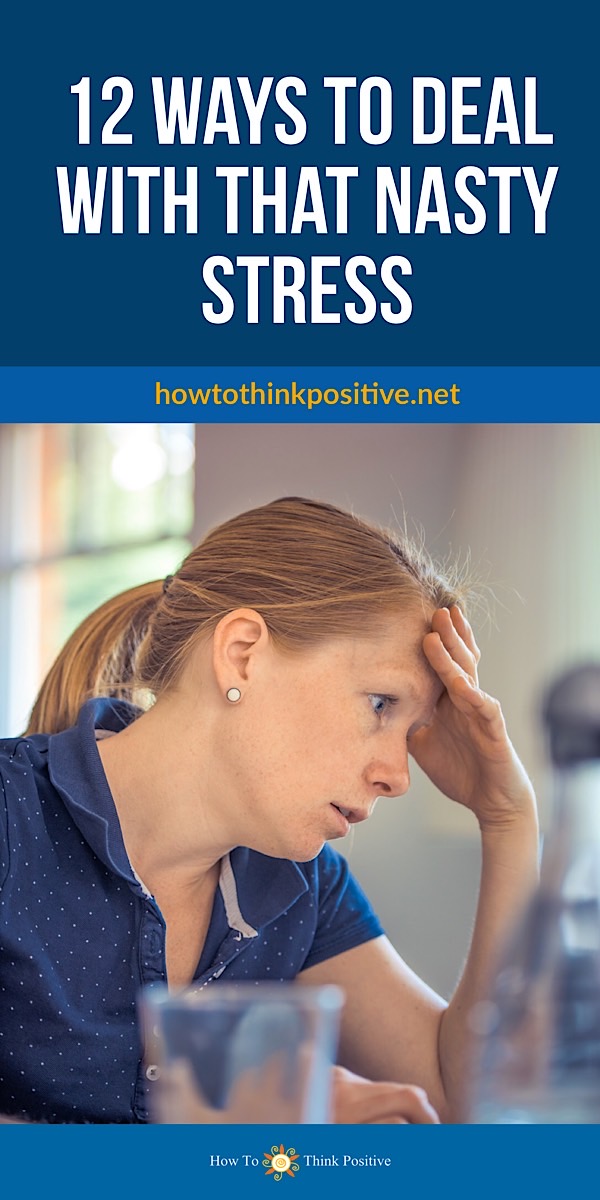Stress is something that happens when you have a lot to deal with emotionally and physically to the point that burdens really overwhelm you. This reason is why you can take on many stressors, and then suddenly something small like dropping a glass of water, makes you start crying or feels like the last straw.
This post contains Amazon affiliate links, meaning I may earn a small commission if you purchase through my links, at no extra cost to you. Note: We aim to provide accurate product links, but some may occasionally expire or become unavailable. If this happens, please search directly on Amazon for the product or a suitable alternative.
When you let stress build-up, it can feel like it’s too much to handle, so you end up doing nothing. Or worse, start trying to cope with stress using alcohol or other unhealthy coping mechanisms. It’s always best to deal with stress head-on, and here are a dozen ways you can do it effectively.
When it comes to dealing with stress there are always different ways to tackle it. No one is able to talk about the best stress remedy, because everyone deals with stress in a different way. In this post we’ll show different ways of dealing with stress, so you can choose some of the ways that works best for you.
1. Using Meditation
By practicing visualization or other forms of meditation, it can help relieve the pressure of increasing stress. You really don’t have to be a pro to get started with something like meditation. Something you can do is use self-help books, online tutorials, guided meditation podcasts, or YouTube videos.
Meditation allows your mind to get out of the middle of the stress and allows you to focus your thoughts. While you’re meditating, the constant bombarding you often get from stress will be removed because it won’t have center stage in your mind.
This practice can be done just about anywhere at any time, and it does not take long to start seeing the benefits of using meditation to minimize your stress. Your body and mind will have a chance to relax when you use meditation.
It helps you let go of stress-induced negativity and instead keep your mind on things that are more positive, peaceful, and the things that are helpful or beneficial to you. Meditation can give you a coping skill that helps you eliminate the effects of the fight or flight response that happens when you are under stress. You can lower your blood pressure and feel the weight of stressors lift off your shoulders.
2. What Are Your Stressors?
Many people are not ready to handle stress because they do not know exactly what is causing the stress reaction in their life. By understanding the causes of your stress, you can control and eliminate it.
Fear and anxiety are stressors. You may feel this kind of stress when you start playing the what-if game: what if your job is lost, what if you can’t pay the bills, what if your relationship breaks, what if you were to get sick, etc.
This is anticipation thinking that takes you out of the present and makes your mind live in a mental state of what “could” happen in the near future. It is worrying about something that has not happened and may never happen.
Problems with family members can also be a huge stressor. You might have people in your life that you just don’t get along with. You could also have family members who are included in situations that are bad, and you feel the stress of that.
Leaving your normal lifestyle can be stressful. This includes things like taking a new job or leaving one, moving to a new house or another state, ending a relationship or starting a new one, going to college or graduating, or having a child or having a kid move out.
It’s anything that changes the way you usually live your life. Health problems can be a stressor. Whenever you are not feeling well or are dealing with a chronic health problem, it can cause you stress.
You feel more stressed when a health problem gets in the way of your ability to manage your daily activities or work. Job performance, both good and bad, can be a stressor.
When you do good at work, you may feel the stress and pressure to continually improve yourself. When things go bad, you may fear the boss’s reaction or the loss of your job.
Balancing work and family is another stressor.
You may be drawn in two directions and feel like your life is out of balance. This can make you feel stressed out because you can’t do your best at work or at home because your time is running out too much.
3. Track your stressors
You can’t fight what you don’t see coming. Though, when you write down what you’re going to be driving that day, it helps you deal with stress. It does this because it will identify all the situations that day and what the possible stressors will be.
Identify what is it about the situation (or the person) that is going to be in your day that is causing you stress. One example is if you have to attend your child’s school for a recital and the ex you don’t get along with is going to be there, you need to know in advance how to handle the negative emotions that will likely surface.
Perhaps you can also devise a strategy to minimize interaction. Know in advance that when you feel anger, you will practice deep breathing meditation exercises, because this can help you keep the situation in control and yourself calm.
4. Discover the power of no
A common cause of stress is being too busy saying yes to others that you end up saying no to yourself. Know your limitations, and don’t exceed them. Every day you will be bombarded with people and situations that want you to say yes and give your time and energy.
If you’re always the type of person who says “yes” to everything, then you are on the road to stress. You cannot take time for yourself or what you really want to do if you don’t practice using the power of no. Most people refrain from saying no for fear of sounding selfish, but saying no to someone is not selfish.
It is practicing the art of self-care. When you have trouble telling other people no, or even telling yourself no to things, you increase your workload and may exaggerate what you are capable of.
You will end up not only stressed, but your immune system can be affected as well, as stress lowers your body’s immune system defenses. Learning to say that you can’t free yourself from the guilt that comes with saying yes.
Many people only accept something because they feel guilty about it or feel guilty about it. Just keep in mind that by saying no, you are taking care of your body, and that is a good thing.
When you say no, let that be your one-word explanation. When someone asks “why not,” in response to your “no,” acknowledge that it is a boundary problem. You don’t owe anyone a reason. By saying no, you free yourself from extending your time too much and causing unnecessary stress.
5. Get enough sleep
If you don’t get enough sleep, it can cause a delay in reaction time in situations like driving or trying to do your job. It also causes memory problems, gain weight, and can lead to serious health problems.
But not getting enough sleep can cause stress and make the stress you already have worse. Lack of sleep affects your decision-making ability, and you end up making poor decisions that increase your stress.
This happens when you get tired and end up inadvertently dealing with whatever it is you’re trying to handle. Then you end up saying no to good opportunities and yes to bad ones.
Lack of sleep can cause a cycle. When you don’t get enough rest, it causes stress, which in turn leads to insomnia. With each feeding off the other, it can cause your stress level to increase and reach the point where it becomes difficult for you to deal with even minor problems.
6. Stop ignoring problems
You may think that it is better not to deal with a problem that is causing you stress than if you do not manage it, you are protecting yourself. But what you’re actually doing is making your stress worse.
Common problems that people don’t like to deal with but that cause stress are home repairs, car repairs, financial problems, child or teen behavior, arguments/problems with your spouse, family problems, environmental problems, or fear of world problems.
When a problem arises, please solve it as soon as possible. If you put it off, the problem can only get worse, and as it grows, you’ll need more energy and resources to fix it.
Problems don’t go away until sunset just because they aren’t solved. They linger, silently annoying in the back of your mind even as you try to ignore them. This inner annoyance is working to increase your stress. Face your problems, face them head-on, and free yourself from stress.
7. Lower your expectations
One of the reasons people have stress is because their expectations are out of control. They have unrealistic expectations for other people and for themselves. And when things don’t go as expected, they are not only disappointed but also stressed.
You can tell if your expectations are causing you to stress if you think your life wasn’t supposed to turn out the way it has, or if you think your partner wouldn’t behave the way it did.
It causes you stress because you expected something that you did not receive. You are disappointed that the image in your mind was not painted correctly in reality. Relief from stress is found in having realistic expectations for yourself and others in your life as well.
Learn to accept yourself for the person you are and others for who they are. As you consider your life, instead of feeling stressed about what hasn’t worked, focus on the good that has. Stop putting pressure and stress on yourself to do more or be more.
8. Find a hobby you enjoy
When you find something you like to do, it acts as a stress reliever because it gives you an outlet. A hobby can be a way to release the anxiety and pent-up emotions that come with dealing with stress.
You can get involved in music, like finding new songs or new bands. You can see the local music scene where you live and attend free music festivals or shows for singers and bands just starting out.
Painting and other creative things like drawing or coloring can be a hobby that works as an escape from stress. There is also journaling. You don’t have to be good at journaling.
It is simply putting words that speak of how you feel or what has happened during the day. Some people are into gardening. You can do vegetable and fruit or flower gardening.
You can make a mix of all three. Starting to knit or crochet is a great hobby that can help you cope with stress. You can learn a new skill like a second language. Or you can learn to play an instrument.
You can participate in community theater or take acting classes. Taking regular walks to explore new places is a great way to deal with stress. So is volunteering. By investing in someone else, you successfully manage stress.
9. Create a to-do list
You may wonder why creating a to-do list is something that can help you manage stress. The answer is simply because as stress hits, you feel like everything goes wrong. You feel like nothing is within your ability to cope.
This feeling of being outside of having control can increase your stress level. Sometimes stress develops because people feel they have so much to do or overcome that it causes paralysis of action, which then worsens the stress.
By creating a to-do list, you help the person prioritize the important things and can focus on accomplishing one thing at a time. Instead of focusing on what they have to do in its entirety, which can increase stress, they can spend the day choosing bite-sized action steps.
Having a step-by-step to-do list allows you to feel in control. This works well even when you don’t necessarily have a lot going on. An actual paper list can take the pressure off the checklist in your mind.

10. Finding a support system
One of the worst things about stress happens when you try to keep it all inside. When your work isn’t working well, your partner isn’t being helpful, and the kids are regularly pushing your buttons, a way to accept the stress you’re feeling is needed.
If you don’t let it out, the pressure of stress increases. You need to have someone to talk to about what is going on. This person may not be able to do anything to change your situation.
But just by being there to listen, you free yourself from the build-up you are feeling. Talking about what is happening with you and what is causing the stress makes you feel a lot better even if the situation is still there.
Your support may be a trusted friend, relative, romantic partner, or a trained counselor. Sharing how you feel relieves emotional toll, such as anxiety and depression, which are often related to stress.
11. Create a strategy
Every part of the stress in your life can be traced back to a trigger. It is always cause and effect. Something happens, and there is a mental, emotional, or physical reaction. There are consequences or changes that led to stress.
For example, your boss gives you a better position. You earn more money. Now you are stressed. Not because you got the position you wanted, but because there are more responsibilities.
It could be more time away from home. You may feel worried about not keeping up.
What you have to do when stress hits is to crawl back to get to the root of your stress. When you find it, you can create a strategy to de-stress.
If you take the new position at work, have a plan for getting more help at home or hiring outside help. If you are concerned about not knowing enough about the new position, ask for help, such as more training or taking a course. Your strategy should make you proactive and show you what to do to help you deal with your stress.
12. Let it go
You have to get to the place where you realize that no matter how hard you try, there are always things you just can’t figure out. If you are wasting time worrying and trying to find a solution for what cannot be fixed, you are only creating stress.
You cannot fix a co-worker who is lazy or an idiot. You cannot force a loved one not to break up with you. You cannot order all the events of your life to be as you wish. You have no control over things that are beyond your ability to change.
What you have to do is accept what you cannot change and make peace with it. When you waste energy, trying to force things that are beyond your reach to happen, you end up frustrated and stressed.
Accepting that you are powerless to change everything that affects you is difficult to do, but necessary to deal with stress. It does not mean that you are weak. It means that you are strong enough to move on with your life instead of getting stuck.
Learn more:
Did You Like This Article?
We Highly Recommend This Guide »









